Đề Cương Ôn Tập Cuối Học Kì 1 Tiếng Anh Lớp 12 Global Success (24.12.2024)
Thầy Thắng
ĐỀ CƯƠNG LỚP 12
15
Ngày đăng: 24-12-2024 09:07:01
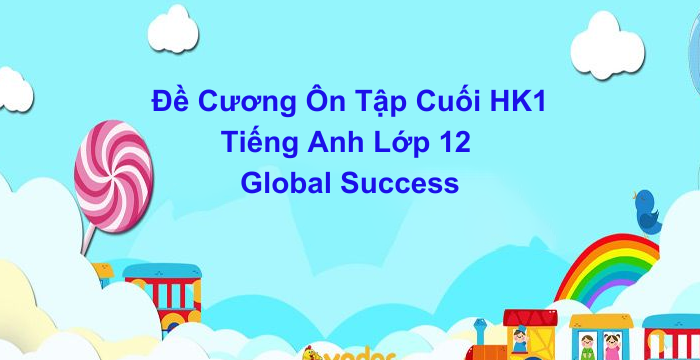
ĐỀ CƯƠNG ÔN TẬP KIỂM TRA CUỐI HỌC KÌ I
Trường THPT Liên Chiểu, TP Đà Nẵng, 2024 - 2025
Nội dung ôn tập: Từ Unit 1 đến Unit 5
1. READING: Topics: Life stories we admire; A multicultural world; Green living, Urbanisation, The world of work
2. LANGUAGE
* Vocabulary: Topics: Life stories we admire; A multicultural world; Green living, Urbanisation, The world of work
* Grammar
+ Past simple & Past continuous
+ Articles
+ Verbs with prepositions
+ Present perfect
+ Relative Clauses referring to a whole sentence
+ Double comparatives to show change
+ Simple, compound and complex sentences
3. WRITING: Unit 1 - Unit 5
II. BÀI TẬP ÁP DỤNG
A. LISTENING
Part 1: Listen to a talk about urbanisation and decide if the statements are True (T) or False (F). You will hear the recording twice.
Statements
1. The talk is about the effects of and solutions for urbanisation.
2. The most important reason for urbanisation is economic expansion.
3. People get better jobs and healthcare in big cities.
4. The most serious environmental effect to people in cities is noise pollution.
5. The speaker will probably talk about the future of urbanisation in the next part.
Part 2: Listen to a talk about Marie Curie's biography and choose the correct answer to each of the following questions. You can listen to the recording TWICE.
1. When did Marie Curie start attending the boarding school of J. Sikosra?
A. in 1867 B. in 1877 C. in 1876 D. in 1883
2. Marie Curie moved to France because…………….
A. She attended a gymnasium for girls.
B. she started her practical scientific training.
C. she pursued education at the Sorbonne University
D. She wanted to get a PhD's degree in Chemistry.
3. Which element was discovered by Marie Curie?
A. X-ray B. Uranium C. Noelium D. Polonium
4. What is not mentioned as an achievement of Marie Curie?
A. She received a master's degree in Physics in 1893.
B. She discovered two new elements for the periodic table.
C. She was the first woman to be awarded two Nobel prizes.
D. She cured cancer and treated injuries for soldiers during World War I.
5. What is true about Marie Curie's life?
A. She was the youngest of the nine children of her parents.
B. She met Pierre Curie in 1894 and they married one year later.
C. She won two Nobel Prizes in Physics in 1903 and 1911.
D. She named one of the elements discovered radium after her homeland.
B. LANGUAGE
B.1. Choose the word CLOSEST in meaning to the underlined word in each of the following questions.
1. Instead of getting rid of fruit peels, we use them to make simple compost.
A. relying on B. throwing away C. preparing for D. responding to
2. After my parents's wedding anniversary party, we decided to give the remaining food to a food bank
A. compost B. ingredients C. leftovers D. garbage
3. He was considered the greatest mathematical genius of his age.
A. a person who is diagnosed with a rare disease
B. a person who is unusually intelligent
C. a person who is not ambitious enough
D. a person who is not fairly creative
4. Air pollution is causing concern among city residents and government leaders.
A. problem B.worry C. competition D. conflict
5. There is a great diversity of opinions on Korean fashion trends among the youth.
A. belief B. container C. popularity D.variety
B.2 Choose the word OPPOSITE in meaning to the underlined word in each of the following questions.
1. The company's sales have doubled since the introduction of new cutting-edge technology.
A. simple B. flexible C. modern D. old-fashioned
2. Although the employment rate has dropped, many people are still looking for work. A. decline B. maintain C.increase D. fluctuate
3. Single-use products provide great convenience, but they also harm the environment. A. Contaminated B. Decomposed C. Reusable D. Released
4. Rivers, lakes, and oceans are contaminated by large farm and transport industries. A. destroy B. pure C. polluted D. healthy
5. This day was chosen to mark the anniversary of the national hero's death.
A. end of life B. life C. deadline D. liver
B.3.Choose the correct answer (Vocabulary)
1. Globalization has led to the spread of different……around the world, allowing people to experience foods from various cultures.
A. technologies B. languages C. traditions D.cuisines
2. The process of……..has made it easier for people to share and enjoy different cultural traditions around the world.
A. isolation B. globalization C. migration D. celebration
3. The rising crime rates in the city are a major……..for local residents.
A. benefit B.concern C. advantage D. belief
4. Parks and green spaces are essential for city…..to relax and escape the urban environment.
A. buildings B. dwellers C. vehicles D. businesses
5. The old town is known for its beautiful French….buildings, which attract many tourists.
A. modern B. frequent C.colonial D. temporary
B.4. Choose the option that completes each of the following sentences (collocation + grammar)
1. Taking many advantages of alcohol obviously…..a negative impact on your house.
A. make B. take C. exert D. gain
2. The successful defense of Dien Bien Phu….a significant achievement for Vietnam in its struggle for independence.
A. marked B. did C. made D. got
3. Many parents should let their children……..a decision on their future career.
A. make B. take C. give D. do
4. The air pollution has been…….a threat to the Earth.
A. making B. having C.posing D. gripping
5. The municipal authority is implementing new policies to address affordable …….shortages.
A. housing B. building C. apartment D. room
6. I think Tet is…….most fascinating festival in Vietnam.
A. the B. Ø (no article) C. an D. a
7. While he…………some plants in the garden, his wife was preparing dinner.
A. waters B. is watering C. would water D. was watering
8. Let me explain………you how composting can significantly reduce household waste.
A. for B. to C. with D. on
9………..he drank,.............he became.
A. More / more violent B. The most / the most violent
C.The more/ the more violent D. The less/less violent
10. He left school without formal qualifications,...........he couldn't find a good job.
A. but B. so C. or D. yet
B.5.Circle the letter A, B, C, or D to indicate the underlined part that needs correction
16. While I was having dinner with my parents, my brother was coming back home from work.
A. having B. with C. was coming D. from
17. The longer the children waited in the long queue, the more impatiently they became.
A. the longer B. waited C. the long queue D.impatiently
18. Many young people lack skills, good education, and financial to settle in the urban areas where many jobs are found.
A. lack B. financial C. urban areas D. are found
19. Henry David Thoreau was an American writer who is remembered for his faith in the religious significance of the nature.
A. an B. is C. for D. the nature
20. The government has built more high-rise buildings although more city dwellers can live closer to the city centre.
A. has B. high-rise buildings C. although D. to
C. READING
C.1. Mark the letter A, B, C, or D to indicate the correct arrangement of the sentences to make meaningful exchange or text in each of the following questions.
Question 1
a. Cross-cultural learning has three main benefits.
b. Secondly, it allows us to learn new ways of thinking and problem-solving by exchanging ideas with others.
c. Finally, it encourages us to appreciate diversity and work together with people from various cultures
d. Firstly, it helps understand and respect different backgrounds, making us more open-minded.
e. So it is important to learn about different cultures around the world.
A.e-b-d-a-c B.a-d-b-c-e C.a-c-d-b-e D.e-d-b-c-a
Question 2
a. With my strong communication skills and friendly manners, I am confident in my ability to greet visitors warmly and handle inquiries efficiently.
b. I am organised, reliable, and eager to contribute to your team.
c. Dear Hiring Manager, I am writing to apply for the part-time receptionist position advertised.
d. Thank you for considering my application.
e. My previous experience in customer service has equipped me with the necessary skills to excel in this role.
f. I look forward to the opportunity to contribute to your organisation. Yours faithfully.
A. c-e-a-b-f-d B. c-a-e-b-d-f C. c-a-d-e-b-f D. c-d-b-a-e-f
Question 3
a. One benefit of urbanisation is better job opportunities.
b. As a result, families can enjoy a higher standard of living and have access to better services like healthcare and education.
c. Also, with more companies competing, wages often increase, which helps people earn more money.
d. When more people move to a city, new businesses open, and existing ones grow.
e. This means there are more jobs available for everyone.
A. e-b-a-c-d B. a-d-e-c-b C. a-b-e-d-c D. c-e-b-d-a
Question 4
a. I agree. The Cycling-to-school programme proposed by Class 12C is going to impress the judges. Cycling to school will also lead to healthier lifestyles in the long run.
b. True. There're so many great ideas. The judges will have a difficult question to make.
c. It's hard to predict who'll win. Other classes also have very interesting projects.
d. Tomorrow, we'll get the results of the Green Classroom Competition. Do you think we will win?
A. d-a-c-b B. a-d-c-b C. a-b-d-c D. d-c-a-b
C2. Read the text and choose the best answers.
An ecosystem is a group of animals and plants living in a specific region and interacting with one another and with their physical environment. Ecosystems (1)........... physical and chemical components, such as soils, water, and nutrients. These components support the organisms living in the ecosystem.
Ecosystems can also be thought of as the interactions among (2)............... organisms in a given habitat. These organisms may range from large animals to microscopic bacteria and work together in various ways. (3).............one species may serve as food for another.
People are part of the ecosystems (4)........ they live and work. Human activities, such as housing developments and trash disposal, can greatly harm or even destroy local ecosystems. Proper ecosystem (5)......... is crucial for the overall health and diversity of our planet. We must find ways to protect local ecosystems without stifling economic development.
(Adapted from www.embibe.com)
1.A.include B. consist C.comprise of D. account for
2. A.all B. every C.each D. both
3.A Therefore B. However C.Although D. For example
4. A. what B.where C.which D. who
5. A. destruction B. introduction C.management D. installment
C.3. Read the text about family and choose the best answers.
The genius
Leonardo da Vinci was one of the greatest painters, architects, and thinkers in his era. His works have influenced not only other artists and painters, but also people working in scientific fields.
He was born in 1452 in a small town near Vinci, Italy, where his surname comes from. Leonardo loved nature and spent a lot of time drawing pictures of animals and plants. He received little formal education, but his uncle and father soon discovered his talent, so they decided to send him to a workshop in Florence to apprentice with ed master artist Verrocchio. Da Vinci not only improved his skills in drawing, painting, and sculpting, but he also picked up knowledge and technical skills in other areas including mechanics, carpentry, metalwork, and architecture.
In 1472. Leonardo qualified as a master artist and opened his own workshop. However, he still continued to work together with Verrocchio for the next five years. After that, he started working independently and completed a painting for the Duke of Milan. His work made a huge impression on the Duke who decided to offer him a position in his court. While in Milan, Da Vinci was invited to design innovative buildings, machines, and weapons. He would draw up plans for several inventions of the future such as tanks, submarines, and flying machines. He was also skilled at drawing detailed sketches of the human body. He left behind several notebooks filled with diagrams, drawings, observations, and notes of his studies, ideas, and inventions.
Unfortunately, his interests were so broad that he often changed his focus to a new project and rarely finished the works he had started. The Last Supper and Mona Lisa were two of the masterpieces he could finish during his lifetime. In 1495, he started The Last Supper, which took him nearly three years to complete. In 1503, he began painting the Mona Lisa and worked on it from time to time over several years until his death.
Da Vinci died in 1519, at the age of 67, but he is still considered as one of the greatest geniuses of all time. His paintings changed the world of art, and many inventions were carried out based on his ideas and sketches. His greatness lies in the depth and diversity of his knowledge, and 500 years after his death, his genius shines as bright as ever.
(Adapted from Workbook global success 12)
What is the purpose of the writer?
A To tell the story of Leonardo da Vinci's life.
B. To describe the family of Leonardo da Vinci.
C. To explain how Leonardo's achievements changed the world.
D. To compare Leonardo da Vinci with other artists.
2. The word 'they' in paragraph 2 refers to
A. Da Vinci's teachers B. Verrocchio's apprentices
C. Da Vinci's uncle and father D. Da Vinci's sculptors
3. The phrase 'picked up' in paragraph 2 is closest in meaning to
A. brought B. took up C. learnt D. raised
4. According to the passage, which of the following is NOT mentioned as something that Leonardo da Vinci designed?
A. The human body. C. Machines that can fly.
B. Military vehicles. D. Ships that can stay underwater.
5. What does the writer imply by saying "his genius shines as bright as ever" in paragraph 5?
A. His creativity and forward thinking continue to amaze people.
B. He discovered how light shines.
C. His genius was made larger than it really is.
D. His invention of a bright light made him a genius.
D. WRITING
D.1 Rewrite the sentences without changing their meaning.
1. During her lunch, there was a knock at the door. (Rewrite the sentence using While.)
-> …………………………………………….
2. They postponed the meeting because it rained heavily. (put) (Rewrite the sentences using verbs with prepositions)
-> …………………………………………….
3. I have never eaten this food before. (Rewrite the sentences using the present perfect tense.)
-> This is the first time……………………………………
4. He behaved in a very strange way. That surprised me a lot. (Rewrite the sentences using relative clauses referring to a whole sentence.)
-> …………………………………………….
5. I wanted to buy a new phone. I didn't have enough money. (but) (Rewrite the sentences using compound sentence.)
-> …………………………………………….
6. As she gets older, she becomes thoughtful. (Rewrite the sentences using double comparatives.)
-> …………………………………………….
D.2. Complete the sentences using the words given
1. This /second time /I / attend such/ exciting/ technology fair.
-> …………………………………………….
2. Daisy/ would like/ be/ accountant/, because/ she /want/ follow/her father's footsteps.
-> …………………………………………….
3. More/ more/ young people/ looking/ affordable housing.
-> …………………………………………….
4. Remember/ rinse/ food containers/ before/ recycle them.
-> …………………………………………….
—THE END—
Giải đáp mọi thắc mắc trong đề vui lòng liên hệ Zalo: 034 8371 758
Theo dõi fanpage để cập nhật nhanh các bài tập và đề kiểm tra mới nhất.
https://www.facebook.com/profile.php?id=61555984765050
Bài Viết Liên Quan

Đề Cương Ôn Tập Cuối Học Kì 1 Tiếng Anh Lớp 12 Global Success (19.12.2025)

Đề Cương Ôn Tập Cuối Học Kì 1 Tiếng Anh Lớp 12 Global Success (3.12.2025)
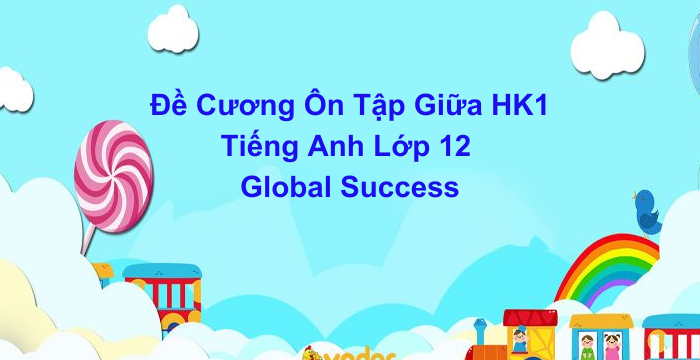
Đề Cương Ôn Tập Giữa Học Kì 1 Tiếng Anh Lớp 12 Global Success (4.11.2025)

Đề Cương Ôn Tập Giữa Học Kì 1 Tiếng Anh Lớp 12 Global Success (4.11.2025)

Đề Cương Ôn Tập Giữa Học Kì 1 Tiếng Anh Lớp 12 Global Success (4.11.2025)

Đề Cương Ôn Tập Giữa Học Kì 1 Tiếng Anh Lớp 12 Global Success (4.11.2025)
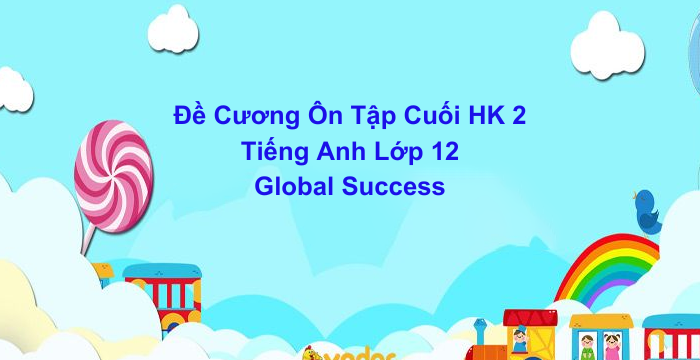
Đề Cương Ôn Tập Cuối Học Kì 2 Tiếng Anh Lớp 12 Global Success (21.04.2025)

Đề Cương Ôn Tập Cuối Học Kì 2 Tiếng Anh Lớp 12 Global Success (16.04.2025)

Đề Cương Ôn Tập Cuối Học Kì 2 Tiếng Anh Lớp 12 Global Success (12.04.2025)

Đề Cương Ôn Tập Cuối Học Kì 2 Tiếng Anh Lớp 12 Global Success (11.04.2025)

Đề Cương Ôn Tập Cuối Học Kì 2 Tiếng Anh Lớp 12 Global Success (10.04.2025)
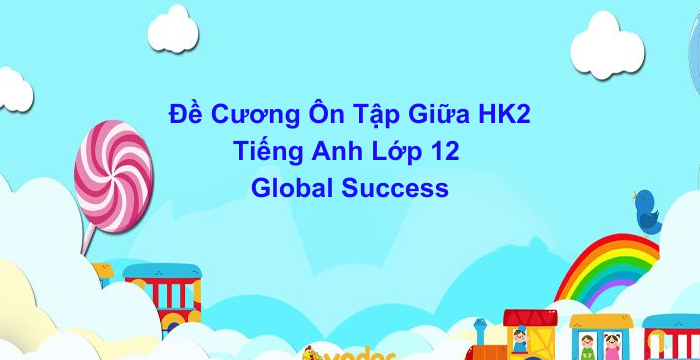
Đề Cương Ôn Tập Giữa Học Kì 2 Tiếng Anh Lớp 12 Global Success (25.03.2025)

Đề Cương Ôn Tập Giữa Học Kì 2 Tiếng Anh Lớp 12 Global Success (20.03.2025)

Đề Cương Ôn Tập Giữa Học Kì 2 Tiếng Anh Lớp 12 Global Success (18.03.2025)

Đề Cương Ôn Tập Giữa Học Kì 2 Tiếng Anh Lớp 12 Global Success (13.03.2025)

Đề Cương Ôn Tập Giữa Học Kì 2 Tiếng Anh Lớp 12 Global Success (03.03.2025)

Đề Cương Ôn Tập Cuối Học Kì 1 Tiếng Anh Lớp 12 Global Success (19.12.2024)

Đề Cương Ôn Tập Cuối Học Kì 1 Tiếng Anh Lớp 12 Global Success (17.12.2024)

Đề Cương Ôn Tập Cuối Học Kì 1 Tiếng Anh Lớp 12 Global Success (13.12.2024)

Đề Cương Ôn Tập Cuối Học Kì 1 Tiếng Anh Lớp 12 Global Success (10.12.2024)

Đề Cương Ôn Tập Giữa Học Kì 1 Tiếng Anh Lớp 12 Global Success (04.11.2024)

Đề Cương Ôn Tập Giữa Học Kì 1 Tiếng Anh Lớp 12 Global Success (03.11.2024)

Đề Cương Ôn Tập Giữa Học Kì 1 Tiếng Anh Lớp 12 Global Success (29.10.2024)

Đề Cương Ôn Tập Giữa Học Kì 1 Tiếng Anh Lớp 12 Global Success (29.10.2024)
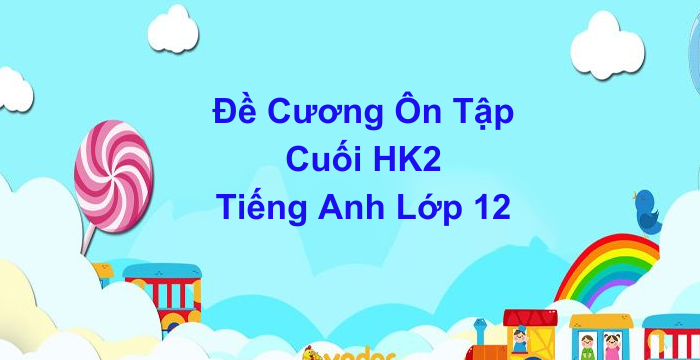
Đề Cương Ôn Tập Cuối Học Kì 2 Tiếng Anh Lớp 12 (13.04.2024)

Đề Cương Ôn Tập Cuối Học Kì 2 Tiếng Anh Lớp 12 (12.04.2024)
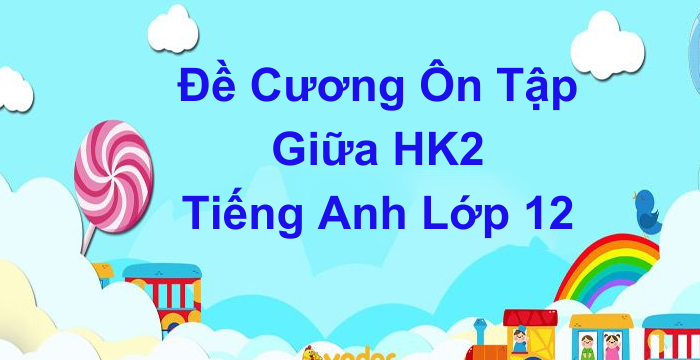
Đề Cương Ôn Tập Giữa Học Kì 2 Tiếng Anh Lớp 12 (07.03.2024)

Đề Cương Ôn Tập Giữa Học Kì 2 Tiếng Anh Lớp 12 (01.03.2024)

Đề Cương Ôn Tập Giữa Học Kì 2 Tiếng Anh Lớp 12 (26.02.2024)

Đề Cương Ôn Tập Giữa Học Kì 2 Tiếng Anh Lớp 12 24.02.2024

Bài Đăng Gần Đây
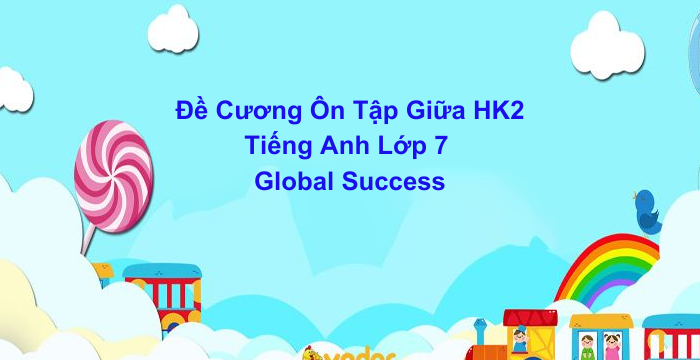
Đề Cương Ôn Tập Giữa Học Kì 2 Tiếng Anh Lớp 7 Global Success (24.02.2026)

Đề Kiểm Tra Giữa Kì 2 Tiếng Anh Lớp 7 Global Success (3.2.2026)

Đề Kiểm Tra Cuối Kì 1 Tiếng Anh Lớp 10 Global Success (02.01.2026)
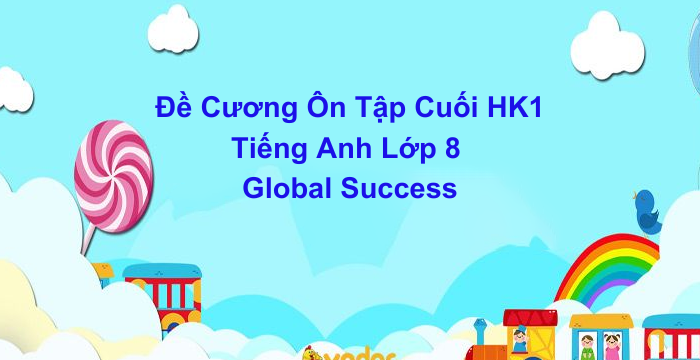
Đề Cương Ôn Tập Cuối Học Kì 1 Tiếng Anh Lớp 8 Global Success (30.12.2025)

